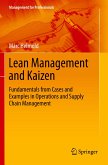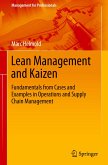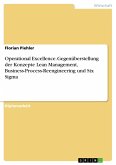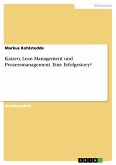Marc Helmold, Ayse Küçük Yilmaz, Triant Flouris
Lean Management, Kaizen, Kata and Keiretsu
Best-Practice Examples and Industry Insights from Japanese Concepts
Marc Helmold, Ayse Küçük Yilmaz, Triant Flouris
Lean Management, Kaizen, Kata and Keiretsu
Best-Practice Examples and Industry Insights from Japanese Concepts
- Broschiertes Buch
- Merkliste
- Auf die Merkliste
- Bewerten Bewerten
- Teilen
- Produkt teilen
- Produkterinnerung
- Produkterinnerung
This book provides a holistic and practical approach to Japanese concepts of lean management throughout the business value chain. It explains principles like Kaizen, Kata or Keiretsu in a pragmatic and logical way with many industry examples and case studies. The authors describe comprehensively how lean management enables companies to concentrate on value-adding activities and processes to achieve a long-term, sustainable competitive advantage. Moreover, the book shows how lean management principles are ultimately applied in industries like aviation, civil engineering, automotive, healthcare, education and other industries. …mehr
Andere Kunden interessierten sich auch für
![Lean Management, Kaizen, Kata and Keiretsu Lean Management, Kaizen, Kata and Keiretsu]() Marc HelmoldLean Management, Kaizen, Kata and Keiretsu53,49 €
Marc HelmoldLean Management, Kaizen, Kata and Keiretsu53,49 €![Lean Management and Kaizen Lean Management and Kaizen]() Marc HelmoldLean Management and Kaizen50,99 €
Marc HelmoldLean Management and Kaizen50,99 €![Lean Management and Kaizen Lean Management and Kaizen]() Marc HelmoldLean Management and Kaizen70,99 €
Marc HelmoldLean Management and Kaizen70,99 €![Successful Management Strategies and Tools Successful Management Strategies and Tools]() Marc HelmoldSuccessful Management Strategies and Tools44,99 €
Marc HelmoldSuccessful Management Strategies and Tools44,99 €![Successful Management Strategies and Tools Successful Management Strategies and Tools]() Marc HelmoldSuccessful Management Strategies and Tools62,99 €
Marc HelmoldSuccessful Management Strategies and Tools62,99 €![Operational Excellence. Gegenüberstellung der Konzepte Lean Management, Business-Process-Reengineering und Six Sigma Operational Excellence. Gegenüberstellung der Konzepte Lean Management, Business-Process-Reengineering und Six Sigma]() Florian PiehlerOperational Excellence. Gegenüberstellung der Konzepte Lean Management, Business-Process-Reengineering und Six Sigma42,95 €
Florian PiehlerOperational Excellence. Gegenüberstellung der Konzepte Lean Management, Business-Process-Reengineering und Six Sigma42,95 €![Kaizen, Lean Management und Prozessmanagement. Eine Erfolgsstory? Kaizen, Lean Management und Prozessmanagement. Eine Erfolgsstory?]() Markus KohlsteddeKaizen, Lean Management und Prozessmanagement. Eine Erfolgsstory?18,95 €
Markus KohlsteddeKaizen, Lean Management und Prozessmanagement. Eine Erfolgsstory?18,95 €-
-
-
This book provides a holistic and practical approach to Japanese concepts of lean management throughout the business value chain. It explains principles like Kaizen, Kata or Keiretsu in a pragmatic and logical way with many industry examples and case studies. The authors describe comprehensively how lean management enables companies to concentrate on value-adding activities and processes to achieve a long-term, sustainable competitive advantage. Moreover, the book shows how lean management principles are ultimately applied in industries like aviation, civil engineering, automotive, healthcare, education and other industries.
Produktdetails
- Produktdetails
- Management for Professionals
- Verlag: Springer / Springer International Publishing / Springer, Berlin
- Artikelnr. des Verlages: 978-3-031-10106-9
- 1st edition 2022
- Seitenzahl: 308
- Erscheinungstermin: 1. September 2023
- Englisch
- Abmessung: 235mm x 155mm x 17mm
- Gewicht: 470g
- ISBN-13: 9783031101069
- ISBN-10: 3031101065
- Artikelnr.: 68530880
- Herstellerkennzeichnung Die Herstellerinformationen sind derzeit nicht verfügbar.
- Management for Professionals
- Verlag: Springer / Springer International Publishing / Springer, Berlin
- Artikelnr. des Verlages: 978-3-031-10106-9
- 1st edition 2022
- Seitenzahl: 308
- Erscheinungstermin: 1. September 2023
- Englisch
- Abmessung: 235mm x 155mm x 17mm
- Gewicht: 470g
- ISBN-13: 9783031101069
- ISBN-10: 3031101065
- Artikelnr.: 68530880
- Herstellerkennzeichnung Die Herstellerinformationen sind derzeit nicht verfügbar.
Dr. Marc Helmold is a Professor at the International University of Applied Sciences (IU), Berlin Campus, Germany. He teaches Bachelor, Master and M.B.A. students in lean management, (total) revenue management, negotiations in the international context, performance management, supply management, general management, strategic management and supply chain management. In parallel, he owns the consultancy MaHeLeanCon and supports international transactions and market entry strategies. Dr. Ay¿e Küçük Yilmaz is Professor in the Faculty of Aeronautics and Astronautics at Eskisehir Technical University, Eskisehir, Turkey. Previously, she has served as Vice Dean for the Faculty of Aeronautics and Astronautics and as Airport Business Manager at the International Eskisehir Hasan Polatkan Airport. Her research interests include performance management, risk management, reputation risk, stakeholder relations, airport business management, culture, supply chain risk management,logistics management, organizational behavior. She has authored a variety of books, book chapters and over 50 refereed journal articles and international conference papers. Dr. Triant Flouris is Vice President of Academic Affairs at Metropolitan College in Athens, Greece. Triant has published numerous works on risk management, strategy, and project management applied to the aviation industry including books, refereed journal articles, and reports. Dr. Thomas Winner is Professor of Civil Engineering at the International University of Applied Sciences (IU), Berlin Campus, Germany. He teaches civil engineering and is the director of civil engineering at IU International University of Applied Sciences. He has 10 years of professional experience as a civil engineer in structural engineering and in project management. Violeta Cvetkoska is an Associate Professor in the Faculty of Economics at Ss. Cyril and Methodius University in Skopje, North Macedonia. Her areas of scientific interest include: management science/operational research, decision science, quantitative analysis for management, data science, business analytics, mathematical programing (DEA) and multi-criteria models and methods for business decision making. She has published one book and various scientific papers in international journals and proceedings of international conferences and symposia. Dr. Tracy Datheis Professor at the Macromedia University in Berlin and works as a business consultant. She has many years of experience in German and Chinese companies, including as CFO of a multinational SME.
Chapter 1: Lean Management: Introduction.- Chapter 2: Kaizen, Kaikaku and Innovation Management.- Chapter 3: Kata - Behavioural Transformation towards Lean Management.- Chapter 4: Keiretsu Networks.- Chapter 5: Kyouiku - The Learning Enterprise.- Chapter 6: Policy Deployment and Hoshin Kanri Strategy.- Chapter 7: Toyota Production System.- Chapter 8: 5S Concept: Muda, Muri and Mura.- Chapter 9: Change (Henkou Kanri) as integral Part of Lean Management.- Chapter 10: Industry 4.0 and Artificial Intelligence (AI) in Lean Management.- Chapter 11: Digital transformation is shaping business transformation.- Chapter 12: Lean Management in Aviation.- Chapter 13: Lean Management in the Automotive Industry.- Chapter 14: Lean Management in the Construction Industry.- Chapter 15: Lean Management in the Railway Industry.- Chapter 16: Lean Management in Healthcare and Hospitals.- Chapter 17: Lean Management in Higher Education (LHE).- Chapter 18: Lean Management in Project Management.- Chapter 19: Lean Management Tools.- Chapter 20: Lean Management Outlook 2030.- Glossary.
Chapter 1: Lean Management: Introduction.- Chapter 2: Kaizen, Kaikaku and Innovation Management.- Chapter 3: Kata - Behavioural Transformation towards Lean Management.- Chapter 4: Keiretsu Networks.- Chapter 5: Kyouiku - The Learning Enterprise.- Chapter 6: Policy Deployment and Hoshin Kanri Strategy.- Chapter 7: Toyota Production System.- Chapter 8: 5S Concept: Muda, Muri and Mura.- Chapter 9: Change (Henkou Kanri) as integral Part of Lean Management.- Chapter 10: Industry 4.0 and Artificial Intelligence (AI) in Lean Management.- Chapter 11: Digital transformation is shaping business transformation.- Chapter 12: Lean Management in Aviation.- Chapter 13: Lean Management in the Automotive Industry.- Chapter 14: Lean Management in the Construction Industry.- Chapter 15: Lean Management in the Railway Industry.- Chapter 16: Lean Management in Healthcare and Hospitals.- Chapter 17: Lean Management in Higher Education (LHE).- Chapter 18: Lean Management in Project Management.- Chapter 19: Lean Management Tools.- Chapter 20: Lean Management Outlook 2030.- Glossary.








